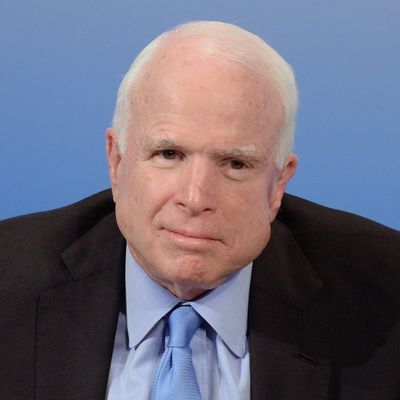
Senator John McCain continued to offer veiled and not-so-veiled criticism of President Trump and his administration over the weekend. In a Meet the Press interview that aired on Sunday, the Arizona Republican indirectly rejected the premise of Trump’s Friday tweet calling critical news organizations the “enemy of the American people,” warning that suppression of the press is “how dictators get started.” McCain ominously reminded host Chuck Todd that authoritarians looking to consolidate their power historically start with eliminating press freedoms. “If you want to preserve democracy as we know it, you have to have a free and many times adversarial press,” McCain insisted. “I’m not saying that President Trump is trying to be a dictator,” he added, “I’m just saying we need to learn the lessons of history.”
In the same interview, McCain indicated that he was worried about Trump’s national-security goals and principles. Asked about his confidence in the president, McCain gingerly explained that he was worried about Trump’s “understanding of some of these issues and his contradictory articulations” regarding areas of U.S. foreign policy like Russia. The senator also called Trump’s recent “moral equivalency” of Vladimir Putin’s Russia and the U.S. “a contradiction of everything the United States has ever stood for in the 20th and 21st century” and warned that achieving some of Trump’s stated goals in Europe “would upset the last 70 years of a new world order.” Trump has previously stated that he thought NATO was “obsolete” and has routinely expressed his support for the dismantling of the European Union.
In light of the ongoing scandal regarding the possible links between the Kremlin and Trump advisers, McCain also concluded that he had “more hope than belief” that Americans could count on the Republican-controlled Congress to investigate President Trump should that prove necessary. Just how much McCain may be able to move that needle, or get such an investigation started by himself, remains to be seen.
The senator’s comments on NBC reflected remarks that he made on Friday at the Munich Security Conference in Germany. In that speech, McCain promoted a worldview that clearly contradicted Trump’s, though McCain declined to reference the president by name. Raising the stakes about as high as they can go, McCain warned conference attendees that the West was now facing an existential threat, and he worried that Western leaders, including in the U.S., seemed ready to give up on it in its hour of greatest need. The former presidential candidate also spoke out against several tenets of Trumpism, including the romanticization of authoritarianism, the disinterest in hard truth, the “turn away from universal values and toward old ties of blood and race and sectarianism,” and the “hardening resentment” toward immigrants and minorities.
All of these remarks also echo or complement the many insights in this week’s New York cover story about McCain by Gabriel Sherman. As Sherman highlights, the “ambivalent maverick” has regularly struggled with when and how to respond to Trump — a dynamic made all the more difficult by how unpredictable the president is and how isolating it can be to speak out against him. Regardless, though the legacy-minded McCain remains caught between president, party, and his occasionally shifting notions of principle, the senator’s pushback on Trump seems to be intensifying.






























